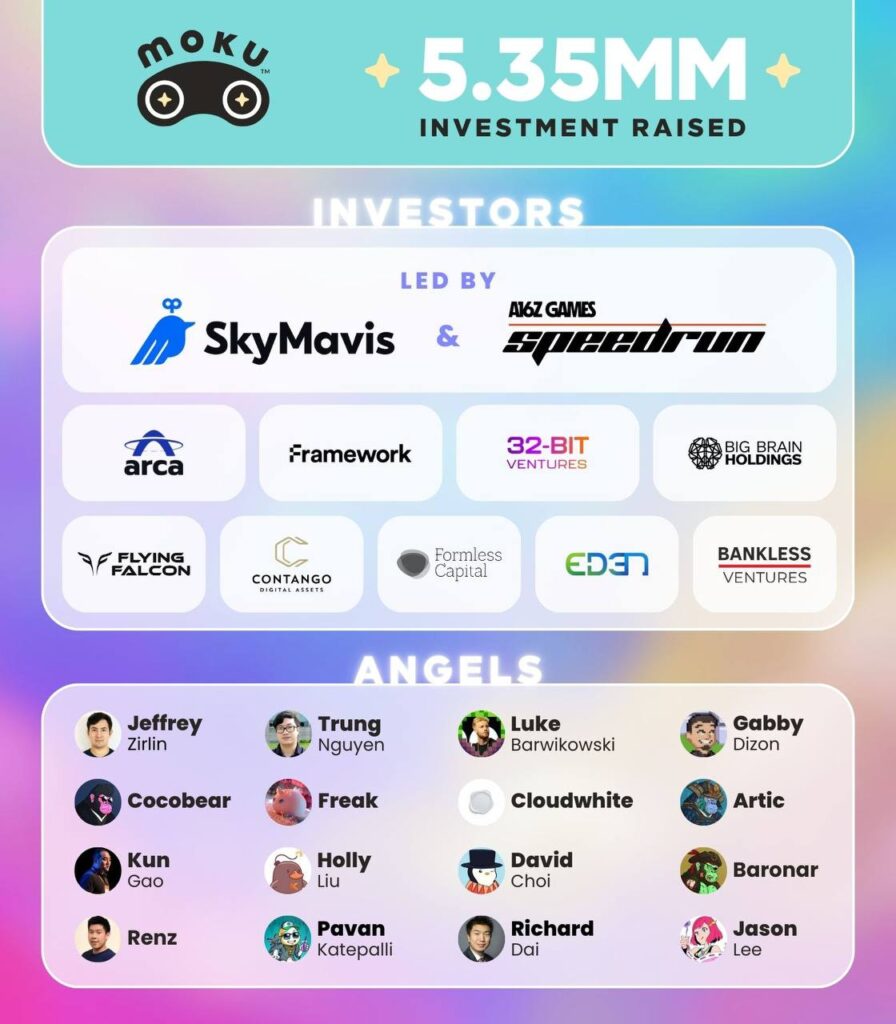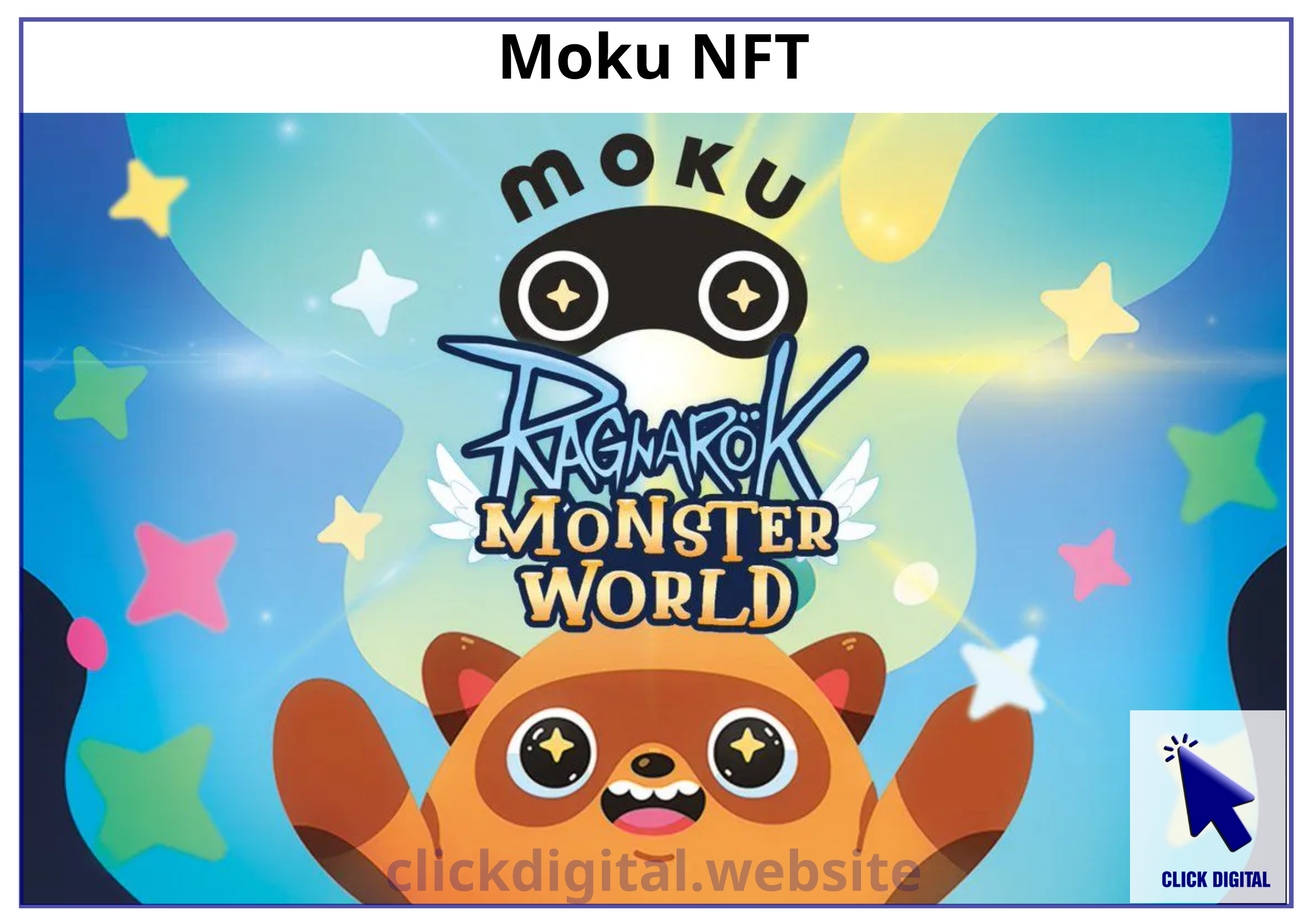Moku, an ambitious project aiming to revolutionize how games are developed and played, has announced the successful completion of its latest funding round, raising $5.35 million. This round was led by two prominent figures in the gaming and blockchain industry: Sky Mavis (the developer of Axie Infinity) and a16z Games (the venture capital fund of Andreessen Horowitz), along with strategic investments from Arca, Framework, and 32-bit Ventures.
Could Moku be the catalyst for a Web3 gaming revolution?
With the goal of empowering players and content creators, Moku is building an ecosystem where the global community becomes co-publishers of games, sharing in the success of Moku.
Table of Contents
What makes Moku special?
Moku leverages Web3 technology to create an advanced distribution ecosystem built on the “Play. Share. Get Rewarded.” model. By blending engaging gameplay with a transparent distribution system, Moku promises a completely new gaming experience for players while offering them opportunities to earn profits from their own activities.
In addition, Moku has released its first NFT:
- 8,888 adorable Moki NFTs
- Priced at 55 RON / NFT
- Public sale on July 9, 2024

Moku aims not only to create entertaining games but also to transform the gaming industry’s mindset. With its groundbreaking vision, Moku has attracted the attention of numerous prominent angel investors in the blockchain and gaming industries, including:
Investor List
| Investor | Description |
| Sky Mavis | Developer of Axie Infinity, one of the most successful blockchain games to date. |
| a16z Games | Venture capital fund of Andreessen Horowitz, a leading global venture capital firm with numerous successful investments in the blockchain space. |
| Arca | Investment fund focused on promising blockchain projects. |
| Framework | Venture capital fund specializing in investments in blockchain and web3 companies. |
| 32-bit Ventures | Venture capital fund specializing in investments in gaming and entertainment companies. |
| Flying Falcon | |
| Contango Digital Assets | |
| Formless Capital | |
| Eden | |
| Bankless Ventures | |
| Big Brain Holdings |
Angel Investor List
| Angel Investor | Description |
| Jeffrey Zirlin | CEO of Axie Infinity. |
| Trung Nguyen | Founder of Axie Infinity |
| Luke Barwikowski | |
| Gabby Dizion | |
| Cocobear | |
| Freak | |
| Cloudwhite | |
| Artic | |
| Kun Gao | |
| Holly Liu | |
| David Choi | |
| Baronar | |
| Renz | |
| Pavan Katepalli | |
| Richard Dai | |
| Jason Lee |
It’s clear that the participation of leading figures in the gaming and blockchain industries reflects strong confidence in Moku’s potential. With its clear vision, well-defined strategy, and community support, Moku is poised to become a game-changer, promising positive changes in the gaming industry.
Moku Summary
| Information | Content |
| Funding Round | Successfully raised $5.35 million |
| Lead Investors | Sky Mavis (Axie Infinity developer), a16z Games (Andreessen Horowitz venture capital fund) |
| Strategic Investors | Arca, Framework, 32-bit Ventures |
| Goal | Empower players and content creators |
| Vision | Build an ecosystem where the global community becomes co-publishers, sharing in Moku’s success |
| Technology | Web3 |
| Model | “Play. Share. Get Rewarded.” |
| Ambition | Transform how the gaming industry thinks |
| Community Role | Community plays a crucial role in project development |
| Angel Investor Support | Many prominent figures in blockchain and gaming: Trung Nguyen, Jeffrey Zirlin, etc. |
Comparing Traditional and Web3 Game Business Models
This comparison table outlines the key differences between traditional and Web3 gaming models:
| Feature | Traditional Game Model | Web3 Game Model |
| Ownership | Players don’t own assets in the game. | Players own digital assets (NFTs) in the game. |
| Earning Money | Players spend money to buy in-game items, often virtual items with limited ownership rights. | Players can earn money from playing games, such as selling digital assets (NFTs), participating in in-game activities to receive valuable rewards (tokens). |
| Distribution | Game developers fully control the game’s ecosystem. | Game ecosystem is decentralized, allowing players to participate in development and management. |
| Transparency | The process of players earning money is often unclear. | The process of players earning money is transparent and verifiable on the blockchain. |
| Interaction | Players can interact within the game but don’t have shared ownership. | Players can interact and jointly own digital assets in the game. |
| Example | League of Legends, Dota 2, PUBG | Axie Infinity, The Sandbox, Decentraland |
Comparing Player Benefits in Traditional and Web3 Game Models
| Benefit | Traditional Game Model | Web3 Game Model |
| Ownership | No ownership rights | Ownership of digital assets in the game |
| Earning Money | Cannot earn money | Can earn money from playing games |
| Control | No control | Participate in development and management |
| Transparency | Not transparent | Transparent and verifiable |
Observation
The successful $5.35 million funding round secured by Moku from leading investors in the blockchain and gaming industry highlights the project’s immense potential. The involvement of Sky Mavis and a16z Games, two prominent names in the sector, signifies that Moku is highly regarded for both its technology and development strategy. With the backing of these renowned angel investors, Moku will gain access to invaluable experience and knowledge, propelling the project towards greater success in the future.
Conclusion
Moku is on track to become a revolutionary project, promising to change how games are developed and played. With its unique “Play. Share. Get Rewarded.” model and community support, Moku has the potential to drive a Web3 gaming revolution.
Will Moku continue to make its mark on the Web3 gaming industry with the help of the top team in the Web3 gaming industry: Axie Infinity and Sky Mavis? Only time will tell.

